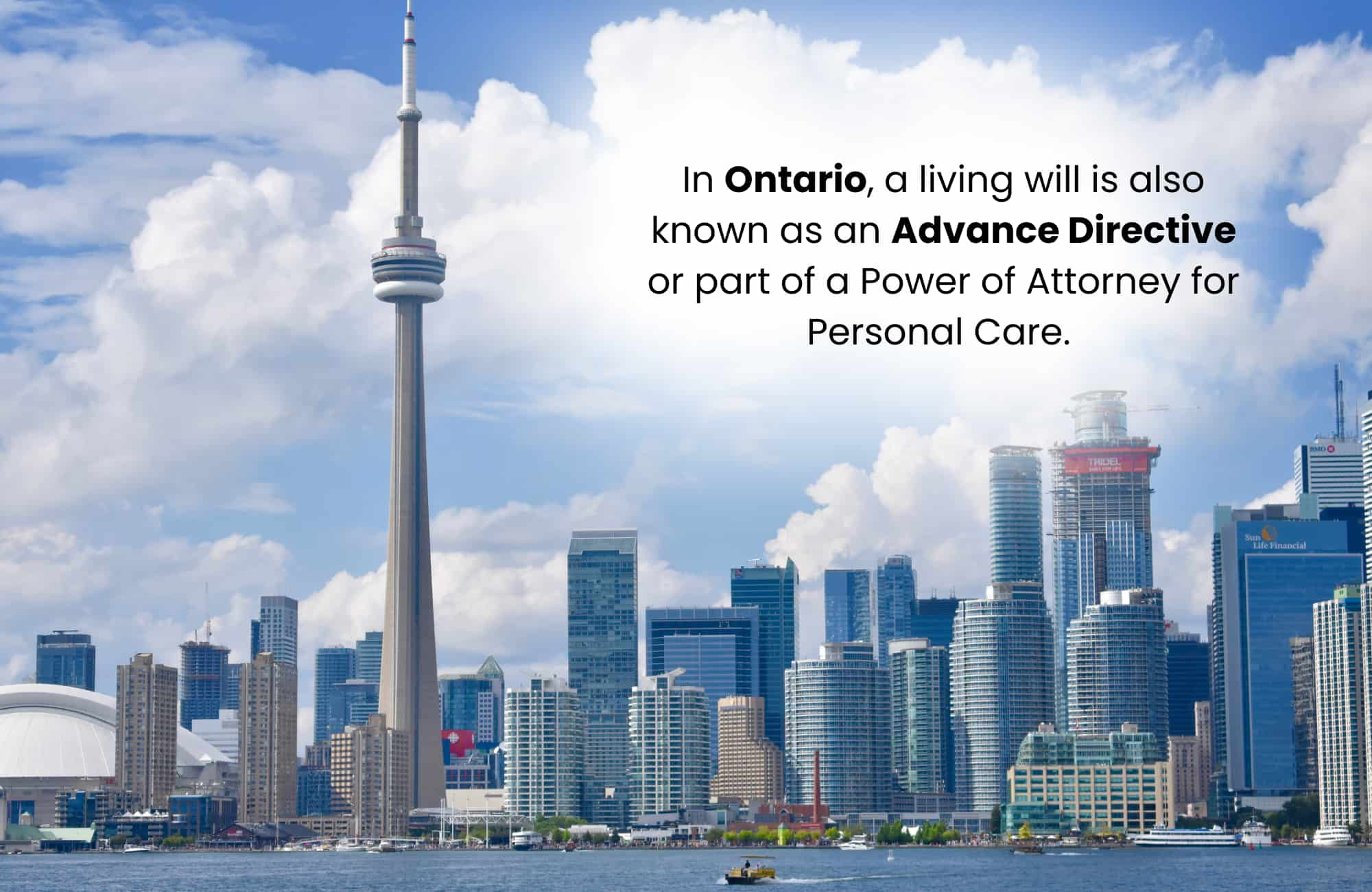Written by Ron Cooke, President & Founder of Strategic Wealth Protection Partners in Ontario, CEA®, Member of the Estate Planning Council Canada
Living Wills in Canada
“What is a living will in Canada?”
In Canada, a living will is a type of advance directive that outlines your wishes for medical care if you become unable to communicate or make decisions for yourself. It typically includes instructions about life-sustaining treatments, such as resuscitation, mechanical ventilation, or tube feeding.
In Ontario, it’s often referred to as part of a Power of Attorney for Personal Care, which also names a substitute decision-maker (usually a trusted family member or friend) to speak on your behalf.
You might be thinking about creating a living will but aren’t sure where to start or whether it’s even necessary. This guide will walk you through everything you need to know so you can make informed decisions about your future healthcare.

Table of Contents
- Key Things to Know About Living Wills in Canada
- Who Can Make a Living Will in Canada?
- Why a Living Will Matters
- What Happens if You Don’t Have a Living Will?
- Living Will vs. Power of Attorney
- Living Will vs POA Comparison
- Living Will vs. Personal Directive
- How to Create a Living Will in Ontario
- Safeguarding and Storing Your Living Will
- How a Living Will Fits Into Estate Planning
- Common Questions
Key Things to Know About Living Wills in Canada
- Clear health care directives help reduce stress and confusion for family members during a medical emergency.
- A living will (also called an advance directive or advance medical directive) outlines your wishes for medical care if you can’t speak for yourself.
- It’s often part of a Power of Attorney for Personal Care, a legally binding document in Ontario.
- It tells health care providers what types of medical treatment or life support (like resuscitation or feeding tubes) you do or don’t want.
- You can state your preferences about artificial life support and other end-of-life decisions.
- In your living will, you should name a substitute decision maker—someone you trust to speak with doctors on your behalf.
- If no one is named, a temporary substitute decision maker (usually a close family member) may be chosen by medical staff.
- A living will is not the same as a last will—it deals with personal care decisions while you’re alive, not what happens after death.

Who Can Make a Living Will in Canada?
In Canada, any adult with mental capacity can create a living will.
In Ontario a living will is also known in Ontario as an Advance Directive or part of a Power of Attorney for Personal Care.
You must be at least 16 years old in Ontario and capable of understanding the nature and consequences of the treatment decisions you’re outlining. Mental capacity means you can fully grasp the choices you’re making and communicate them clearly.
This is crucial, as the law will not honour a living will created under coercion or confusion.
Because each province has its own rules, it’s important to ensure your living will aligns with Ontario’s specific legal framework and terminology.
📖 Related Read: Can I Write My Own Will in Ontario?

Why a Living Will Matters
A living will empowers you to stay in control of your medical care, even if you’re unable to speak for yourself.
In moments of crisis, it provides clarity for your family and healthcare providers, eliminating guesswork and emotional turmoil. It ensures your choices regarding life support, resuscitation, or end-of-life care reflect your values, beliefs, and dignity.
For blended families, it also prevents disagreements between loved ones who may have differing views.
What Happens if You Don’t Have a Living Will?
Without a living will, your care decisions may be made by someone who doesn’t fully understand or agree with your wishes.
The law assigns a substitute decision-maker, usually starting with your spouse or closest relative, but this may not be the person you trust most. This can lead to confusion, delays, or conflict—especially in complex or blended families.
Doctors must follow consent laws, and without clear direction, your end-of-life care may not reflect what you would have chosen.
Living Will vs. Power of Attorney
A living will outlines your specific medical care preferences, while a Power of Attorney for Personal Care appoints someone to make those decisions on your behalf if you’re unable to.
In Ontario, the two documents often work together—your Power of Attorney ensures decisions are made, and your living will guides those decisions. The living will gives voice to your values, while the attorney speaks for you. Both are essential to protect your dignity, autonomy, and peace of mind. Together, they form a strong line of defence against uncertainty. (+)
Living Will vs POA Comparison
| Feature | Living Will | Power of Attorney (POA) |
|---|---|---|
| Purpose | States a person’s preferences for medical treatment, particularly end-of-life care. | Appoints someone to make decisions on your behalf for health care or financial matters. |
| Legal Recognition | Recognized in most provinces, though not always as a standalone document. Often part of a health care directive or personal directive. | Legally recognized across Canada; specific rules and names may vary by province (e.g., Mandate in Quebec). |
| Who Makes the Decisions | No one is appointed—used to guide health care providers or substitute decision-makers. | The named attorney (or mandatary in Quebec) is legally authorized to make decisions. |
| When It Applies | Becomes relevant if the person is unable to communicate or make medical decisions. | Can take effect immediately or upon incapacity, depending on how it’s written. |
| Legal Authority | Provides guidance but does not grant decision-making power. | Legally authorizes someone to act on your behalf. |
| Common Names by Province | Sometimes called an Advance Directive or part of a Personal Directive. | May be known as Enduring POA, Continuing POA, or Mandate in Case of Incapacity in Quebec. |
Living Will vs. Personal Directive
In Ontario, what many provinces call a personal directive is typically included in your Power of Attorney for Personal Care, which can contain your living will instructions.
The main difference is terminology and format: in some provinces, a personal directive is a standalone document, while in Ontario, it’s part of the broader Power of Attorney.
The key takeaway is that both set out healthcare preferences and appoint someone to carry them out. What matters is having the right document for your province—and in Ontario, we’ll make sure it’s done right.

How to Create a Living Will in Canada
Creating a living will in Ontario begins with preparing a Power of Attorney for Personal Care, where you can include specific instructions for your future medical treatment.
You must be 16 years or older and mentally capable of understanding the decisions you’re making. Legal counsel isn’t required—but it is highly recommended to ensure your wishes are clear and your documents are legally sound. We’ll guide you through every step so that nothing is missed.
- Begin by preparing a Power of Attorney for Personal Care, which is where you can include your living will instructions.
- Clearly state your health care preferences, such as resuscitation, life support, or other end-of-life treatments.
- You must be at least 16 years old and mentally capable of making personal care decisions.
- Legal assistance is not required, but strongly recommended to ensure clarity and compliance with provincial laws.
- Store the document in a safe, accessible place and inform your substitute decision-maker or loved ones.
Review and update your instructions as your values or medical preferences evolve.

Safeguarding and Storing Your Living Will
Once your living will is prepared, safe and accessible storage is vital.
Keep the original in a secure location, such as a fireproof home safe, and provide copies to your appointed Power of Attorney, your doctor, and a trusted family member. Let them know where the document is kept, and ensure they understand its contents. In a medical emergency, having quick access to your living will can make all the difference.
📖 Related Read: Is a Living Trust Better than a Will in Canada?
How a Living Will Fits Into Estate Planning
Your estate plan isn’t complete without a living will.
A living will is the personal, compassionate side of your legacy. While your will speaks for your financial assets, your living will speaks for your values, your dignity, and your final wishes.
It ensures your voice is heard when you’re most vulnerable and prevents loved ones from having to make heartbreaking decisions in the dark. For blended families, it reduces confusion and promotes unity.

Common Questions
What is the difference between a will and a living will in Canada?
A will outlines how your assets will be distributed after death, while a living will provides instructions for your medical care if you’re unable to speak for yourself. They serve different purposes and are both essential parts of a complete estate plan.
Is a living trust better than a will in Canada?
A living trust can help avoid probate and provide more privacy, but it doesn’t replace the need for a will. Whether it’s better depends on your goals, assets, and family dynamics—especially in blended families.
What do I do with my living will once it’s been created?
Store it in a safe but accessible place and give copies to your Power of Attorney, doctor, and trusted family members. Make sure they know where to find it and understand your wishes.
Do I still need a regular will?
Yes, a regular will is still necessary to handle your estate, name executors, and distribute assets after death. A living will only covers medical decisions while you’re alive but incapacitated.
Do I need a witness when making a living will?
In Ontario, a living will included in a Power of Attorney for Personal Care does not legally require a witness, but it’s strongly recommended for clarity and proof of intent. Legal advice ensures it meets provincial requirements.
Do I need a lawyer to make a living will?
A lawyer isn’t required, but having one ensures your living will is legally sound, clear, and aligned with your full estate plan. This is especially important in blended families or complex situations.
Are living wills legally binding?
Living wills are not legally binding like a contract, but they are strongly respected by healthcare professionals and courts in Ontario. They guide your Power of Attorney and medical team in making decisions that reflect your values.
Can a power of attorney override a living will in Canada?
Yes, a Power of Attorney for Personal Care can override a living will, but only if acting in your best interest and if the living will lacks clear direction. This is why both documents should be created together and carefully aligned.
What is the difference between a power of attorney and a living will in Ontario?
A Power of Attorney appoints someone to make decisions for you, while a living will outlines the specific decisions you want made. In Ontario, both are usually included in the same legal document for seamless guidance and authority.
Key Takeaways:
- A living will ensures your medical wishes are known and respected, even if you’re unable to speak for yourself.
- In Ontario, your living will is typically included in your Power of Attorney for Personal Care, providing both instructions and decision-making authority.
- Without a living will, loved ones may face confusion, conflict, or delays in your care, especially in blended families with differing views.
- Creating and safely storing your living will is essential—and it must be shared with your Power of Attorney, doctor, and key family members.
- A living will is a vital part of your full estate plan, offering peace of mind and protecting your dignity during life’s most vulnerable moments.
Now is the time to plan. Book your confidential estate planning consultation today.
A Will Isn’t Enough to Protect Your Family’s Inheritance
Writing a will is a crucial step, but it’s just the beginning.
A will only states who gets what, but it doesn’t help you minimize estate taxes, avoid probate fees, or prevent legal delays.
In Ontario, probate fees (Estate Administration Tax) and capital gains taxes on properties can take a significant portion of your estate. If you own multiple properties, the financial burden could be even greater, forcing your loved ones to sell assets just to cover unexpected costs.
Without proper estate planning, your family could receive far less than you intended. The good news? There are strategies to protect your wealth—but they must be set up before it’s too late.
Keep Your Wealth in the Family with Proper Planning
A well-structured estate plan does more than just pass on your assets—it ensures your wealth stays in the family.
By using tools like trusts, life insurance, and gifting strategies, you can:
✅ Reduce or eliminate probate fees
✅ Minimize capital gains taxes on real estate
✅ Prevent legal disputes and family conflicts
Without these safeguards, your loved ones may face delays, unnecessary legal battles, and financial strain. A strong estate plan gives you peace of mind, knowing that your family will be cared for and your legacy will be protected exactly as you intended.
Schedule a Living Estate Plan Consultation
Planning your legacy is about more than numbers—it’s about ensuring your family remembers you and your values are honoured for many years to come.
Estate planning and trusts can feel overwhelming, especially if it’s your first time. That’s why we’re here.
With our simple, 5-Step Living Estate Plan, we make the process easy, helping you create a comprehensive estate plan or trust that protects your assets from taxes and probate fees while preserving your legacy. Tools like The Final Word Journal capture your story, wishes, and essential details like accounts and end-of-life plans, ensuring your family has clarity and comfort.
Take the first step today—schedule a consultation call and give your family the ultimate gift: peace of mind and the assurance they were always your priority.
Read More
If you’re writing a will, you may find these articles helpful:
- Living Will Ontario: What It Is and How It Works
- What Are the Types of Wills in Ontario?
- What Is the Cost of a Will in Ontario?
About the Author
RON COOKE, PRESIDENT & FOUNDER OF STRATEGIC WEALTH PROTECTION PARTNERS

With over 30 years in financial services, I’ve seen the challenges families face when a loved one passes—lost assets, unnecessary taxes, and emotional stress. That’s why I created the Living Estate Plan, a comprehensive process to protect assets, eliminate estate and probate fees, and create legacies that are remembered for many years to come.
This plan ensures your family receives not just your wealth, but a meaningful reminder of your care and love. Tools like The Final Word Journal capture your story, wishes, and essential details, offering clarity and comfort during difficult times.
Your final gift should be more than money—it should be peace of mind, cherished memories, and an organized estate.
Schedule a Call
Schedule a 30-minute consultation call with Strategic Wealth Protection Partners.
Click HERE to schedule a consultation.









